Cash Flow Fight Club
Cash Flow. You love it. You want it! We’re all seeking it, but what’s the best way to generate it? Google Cash Flow and get instantly overwhelmed. With so much noise and marketing hype out there, how do you know which approach is the best for you? We’ve wrestled with massive amounts of research, opinions and experimentation trying to find the best methods. Now we’re on a mission to find the best methods and give you all the dirty details - Fight Club style! In our signature Fight Club matchups, we bring together the heavyweights of business and investing to debate the risks, rewards and the inside scoop on the best ways to generate life-changing cash flow that can put you on the path to financial freedom. And after battling it out in the arena over 3 rounds, we crown the Champion. We alternate Fight Club matchups by going In the Champion’s Corner, where we’ll discover what it takes to forge a champion. Mindset, high performance habits, best-in-class behaviors and more of what it takes to be successful – in your finances and in life. So whether it’s passive income, real estate, side hustles or cash-flowing business ventures, we’re bringing you all the details in the most informative and entertaining show on the airwaves. Join us to see who’ll reign supreme! Who will take home the title of Cash Flow Fight Club Champion. And the 1st rule of the Cash Flow Fight Club – hit subscribe and don’t miss even 1 battle among the titans of Cash Flow. It’s going to be epic!
Episodes
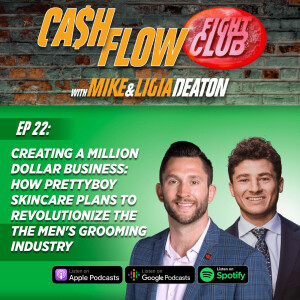
Wednesday Dec 06, 2023
Wednesday Dec 06, 2023
How can you transform a dream into more than just a reality, but a thriving million-dollar venture? These two college best friends went from dreaming of entrepreneurship to creating a successful skincare company. Discover how Ben and Kevin, Founders of PrettyBoy Skincare, turned their college dream into a blossoming million-dollar brand.
From product formulation to brand building, their story is packed with valuable lessons. Hear how they validated their concept through customer research, worked with experts to formulate their product, and built their brand experience. Ben and Kevin also share the challenges of scaling their business while staying true to their values.
Here are some power takeaways from today’s conversation:
00:00
03:04 - Ben and Kevin’s background from college friends to business partners
11:47 - Creating a skincare brand for men
16:37 - The power of hiring experts
19:11 - Putting customers first and seeking support from the community
27:35 - Their approach to branding, marketing, and messaging
37:01 - Their vision of the future
45:03 - Tips for getting started with a business and finding the right partner
Episode Highlights:
[11:47] Creating PrettyBoy Skincare
Ben and Kevin built PrettyBoy from an idea sparked by their own struggles with skin issues and an unmet need in the men's skincare market. They validated their concept through customer surveys to understand pain points and product preferences. Armed with this research, they worked with dermatologists and chemists to formulate a simple, high-quality product containing clinically-backed ingredients. To launch their brand, they focused on creating an experience that resonated with their target demographic through messaging, imagery and a focus on quality. Starting as an online-only business, PrettyBoy is now a growing enterprise disrupting the men's grooming industry through authenticity and effective products.
[16:37] The Power of Experts
Ben and Kevin emphasized the importance of leveraging experts throughout their journey of building PrettyBoy Skincare. With a clear vision but limited technical knowledge, they were able to fill critical gaps by working with dermatologists, chemists and manufacturers who helped turn their concept into a reality. By providing directives based on customer research and prioritizing clinical efficacy, Ben and Kevin allowed experts to help implement their vision. This approach demonstrated that entrepreneurs don't need to know everything themselves - with a well-defined goal and willingness to learn, hiring the right experts can help overcome challenges and accelerate progress towards success.
[19:11] Building a Successful Brand: Putting Customers First and Seeking Support from the Entrepreneurial Community
When starting a brand, whether it's a restaurant or any other business, it's essential to prioritize the vision of your customers. Instead of beginning with the brand itself, focus on sourcing everything that your customers desire in a skincare product. By understanding their top concerns, preferred texture, and desired usage, you can build a brand and formulate products accordingly. Seek feedback from dermatologists and engage with the entrepreneurial community, as they are often willing to provide valuable support and guidance. Remember, being customer-obsessed and open to seeking help are crucial factors in creating a product that people want to buy and ensuring a successful journey in the business world.
Resources Mentioned:
PrettyBoy Skincare
The Gap and The Gain

Wednesday Nov 29, 2023
Wednesday Nov 29, 2023
In this episode of the Cash Flow Fight Club, high performance coach Trevor McGregor shares his inspiring story of overcoming adversity and building a successful coaching practice and real estate portfolio. He outlines his framework for developing an unstoppable champion mindset, emphasizing the 4 S's - State, Story, Standards, and Strategy. Trevor's practical examples show how small shifts in each area can lead to exponential results. Get motivated to level up in 2024 with this action-packed episode. Your dreams are within reach when you have the right mindset.
Here are some power takeaways from today’s conversation:
00:00
[04:03] - Trevor’s childhood and career background
[08:16] - How adversity brings with it the seed of opportunity
[15:03] - How he ended up working for Tony Robbins
[18:38] - Ways to find your purpose
[22:05] - The benefits of coaching
[31:03] - The power of controlling your own state through changing your physiology
[32:00] - The Big 3 - money, health, relationships
[46:18] - The law of familiarity
[1:02:00] The 4S framework for achieving peak performance and success
Episode Highlights:
[08:16] How Adversity Brings with It The Seed of Opportunity
Having lost everything in a failed business venture, Trevor found himself at rock bottom. However, it was during this difficult time that he discovered real estate investing, a path he had never considered before. Taking a chance, Trevor purchased his first property, igniting a successful career in real estate and coaching. He emphasizes that although pain and adversity are challenging, they push us outside our comfort zones, opening us up to new possibilities. Adversity forces us to reinvent ourselves and explore alternative paths, leading to the discovery of untapped talents and opportunities we may have never considered. Trevor's story serves as a reminder that within every challenge lies hidden potential, waiting to be embraced with courage and determination.
[46:18] The Law of Familiarity
The law of familiarity states that when we feel something is familiar to us, we tend to like it and do more of it. Trevor discusses this law when talking about Geno Smith's journey in the NFL. Even when Smith was a backup quarterback, he would practice plays and scenarios as if he was the starter, to make the experience feel familiar. This helped him stay ready and prepared for his opportunity. Trevor believes modeling other successful people is a way to feel familiar with achieving similar results. As we expose ourselves to strategies, mindsets and habits of high performers, they start to feel familiar and we are more likely to implement them in our own lives. In this way, the law of familiarity can help us accelerate our learning and progress towards our goals.
[1:02:00] The 4S Framework for Achieving Peak Performance and Success
State - Your state is your focus, language, and how you're showing up mentally and physically. Trevor shares how shifting your physiology through movement can positively impact your state.
Story - He says your story is your identity - are you operating from a victim or victor mindset? Trevor talks about leaving behind identities that are holding you back.
Standards - Trevor stresses the importance of continually raising the bar for yourself across different areas of your life. Whereas others are satisfied, champions demand more of themselves.
Strategy - Trevor defines strategy as having clarity on your desired outcome, why you want it, and what actions to take. With the right strategy, your goals feel achievable and within reach.
Resources Mentioned:
www.trevormcgregor.com
Think and Growh Rich

Wednesday Nov 22, 2023
Wednesday Nov 22, 2023
Today, we're embarking on a fascinating exploration of two unconventional business models: online tutoring services and vending machine businesses. While these ventures may be off the beaten path, they offer rich rewards in their unique niches. Nicole Whitworth leads the way with her knowledge-based business, which guides nursing students through the complexities of the education system. Her innovative approach addresses a significant need, turning academic challenges into opportunities for growth.
In the sunny climes of Florida, Steven Slagle has capitalized on a different kind of need with his vending service model. As temperatures rise worldwide, he caters to America's love for ice, turning a simple necessity into a thriving business. Join us as we dive deeper into the workings of these dynamic enterprises, exploring their unique appeal and uncovering the secrets of their success!
Here are some power takeaways from today’s conversation:
03:22 - Introduction
06:01 - Nicole’s background in the tutoring industry
08:43 - Steven’s background in the ice vending service industry
14:44 - Vending machine business model: process, investment, payback
21:01 - Business model for nursing tutoring platform
32:27 - Remote machine management and customer service
47:05 - Business and competition in the tutoring industry
49:59 - Growing an online tutoring business for nursing students
51:44 - Tips for running online business
Episode Highlights:
[14:44] The Vending Machine Business Model
Process:
Location scouting is a major time investment to find the best places to maximize revenue
Pitching the idea to landowners/business owners to get permission to place machines
Working with a manufacturer like Everest to purchase, customize, and get machines placed
Investment:
Machines range from $50,000-$60,000 each to purchase
It's a considerable investment to buy multiple machines
Payback:
Steve aims for a two-year payback period for the machines to pay for themselves
Low overhead costs like maintenance help accelerate the return on investment
Seasonality in Florida requires budgeting for slower winter months
Overall, this model requires upfront costs, learning curves, and balancing machine placements with profitable locations and lease agreements. But with the right locations, vending machines can generate ongoing passive income.
[21:01] Business Model for Nursing Tutoring Platform: Business Funnels and Automation
Nicole's innovative nursing tutoring platform uses a multi-pronged approach, offering self-study courses on key topics and a monthly membership for access to all content, a student forum, and weekly live group sessions. Memberships are available at discounted rates for longer terms. Nicole's model focuses on nurturing a nursing mindset in students, bolstering their academic and career success. Automation allows for passive operations, enabling her to focus on member support. Her long-term vision includes business expansion by growing the membership base, aiding more students, and potentially teaching others her tutoring methods.
[51:44] Tips for Running an Online Business
Perfection shouldn't be your initial goal. Instead, launch your product and focus on marketing and gathering feedback. Conduct market research to ensure your solution addresses the right problem. A pre-sale can validate your idea before full-fledged production. Engage with communities like Facebook groups to better understand your target market's needs. Be open to experimentation and pivot your offerings based on what resonates with your audience. Automate tasks like emails to free up your time and maintain a mindset that if your solution can make a difference, it's essential to get it out there through consistent marketing.
Resources Mentioned:
Steven’s website: www.beachsideice.com
Nicole’s website: www.yournursingtutor.com

Wednesday Nov 15, 2023
Wednesday Nov 15, 2023
Learn how mastering the art of selling can be a life-changing skill for success. In this episode, Keeley Hubbard shares valuable insights into how to turn strangers into repeat investors through sales mastery and developing a championship mindset. A passionate sales coach who has a super impressive track record of amassing over $800 million in revenue and 17 years of experience in sales and executive leadership, Keeley talks about leaving corporate burnout to pursue entrepreneurship and real estate.
Listen to this episode as she discusses overcoming limiting beliefs and resistance through daily habits like journaling and affirmations. Learn tips for taking action in the face of obstacles and cultivating a growth mindset through small wins.
Here are some power takeaways from today’s conversation:
00:00
03:25 - Keeley’s career background
07:01 - Techniques to push you through imposter syndrome
08:26 - The concept of “stacking” your wins
11:25 - Finding joy and success in business
19:08 - Rising above your roles and your failures
25:47 - Charging based on your worth
31:24 - Ways to overcome resistance and building a champion mindset
41:48 - Enhancing creativity through unplugging and time-blocking
Episode Highlights:
[07:01] The Concept of Stacking Your Wins
The concept of stacking your wins is a powerful mindset shift that can propel individuals towards success. It's about nurturing the belief in yourself and your ability to win, which then drives the actions needed to achieve your goals. This strategy involves celebrating even the small victories along your journey, thereby building a track record of success that strengthens your self-confidence and perseverance. This approach aligns with teachings from thought leaders like Dan Sullivan and Tony Robbins, who emphasize the role of belief and confidence in personal growth. Adopting this technique can involve simple practices, such as daily reflections on your achievements, no matter how small they may seem. This helps cultivate an attitude of accomplishment and progress, as opposed to focusing solely on unmet goals or challenges ahead.
[11:25] Finding Joy and Success in Business
In the relentless pursuit of success, one can easily lose sight of the joy inherent in the journey, transforming it into a never-ending chase that feels unfulfilling. It's unnecessary to build another prison where you're shackled by your own goals and mindset. But you can still achieve more by doing less and still make an impact on others.
[19:08] The Arena of Life: Separating Role Performance from Self-Worth
Many people, when faced with failure in their various roles - be it as a business owner, parent, coach, or spiritual guide - tend to internalize these setbacks and label themselves as failures. This self-attached label can trigger a downward spiral, as our lives are composed of numerous roles, and the performance in each should not define our self-worth. It's crucial to understand that failing in a role does not equate to personal failure. For example, if one experiences failure as a business partner, it doesn't tarnish their worth as an individual. Maintaining a self-perception of always being a '10', irrespective of role performance, can significantly enhance resilience and readiness for future ventures.
[25:47] Charging Based on Your Worth
Often, the biggest obstacle people face is not their skill set or knowledge, but rather the self-doubt that resides within their minds. This issue is particularly prevalent in sales and among business owners, especially women. The tendency is to undervalue oneself and charge based on what is believed others are willing to pay, rather than acknowledging personal worth. It's crucial to understand that there's a reason for the price you set, and it should reflect your worth, not others' perceived willingness to pay.
Resources Mentioned:
www.keeleyhubbard.com
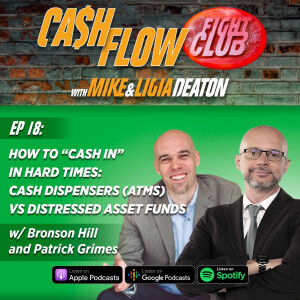
Wednesday Nov 08, 2023
Wednesday Nov 08, 2023
Get ready to dive into the world of alternative investments with Bronson Hill and Patrick Grimes. In today's show, Bronson takes us through the exciting journey of his ATM fund investment, highlighting consistent monthly cash flow, tax benefits from depreciation, and stellar overall returns. Meanwhile, Patrick unveils the details of his Recessionary Acquisitions Fund, where distressed assets are acquired at discounted prices for cash, with quick turnaround times and projected annual returns of 30-40%. Join us as we explore the risks and advantages of each investment, including essential needs, flexibility to exit, and downside protection.
Finally, find out why Bronson's fund earns the spotlight for its ability to harness the time value of money, delivering upfront returns through monthly distributions. Sit back, relax, and let's deep-dive into these intriguing investment opportunities!
Here are some power takeaways from today’s conversation:
[02:46] - Bronson and Patrick’s background
[10:32] - Patrick’s recessionary acquisitions strategy
[19:50] - Bronson’s ATM fund
[26:33] - The ATM fund’s minimum investment, ROI
[40:54] - Diversifying retirement account funds
[44:32] - The benefits of checkbook control accounts
[48:52] - Risks in ATM funds
Episode Highlights:
[10:32] Patrick’s Recessionary Acquisition Strategy
The recessionary acquisitions strategy involves capitalizing on buying opportunities during economic downturns, specifically, buying distressed properties from owners needing quick exits, closing within 14 days of due diligence. Properties are bought all-cash at a discount, often 20-30% below market value. This approach focuses on making immediate returns on the acquisition, allowing for compounding growth by reinvesting and acquiring additional assets. Through tax advantage exchanges and strategic selling, one asset can be transformed into two, and further multiplied. As we approach 2025, with an expected increase in distressed operators, taking action and purchasing quickly becomes crucial for long-term financial success. This strategy minimizes risk by calculating returns precisely and allows for flexibility in case of unfavorable market conditions.
[19:50] Bronson’s ATM Fund: Consistent Cash Flow
The ATM Fund offers investors the opportunity to diversify their investment across a portfolio of over 25,000 ATMs across 12+ states. With a minimum investment of $52,000 (which may increase to $100,000), investors can expect consistent monthly cash flow, known as a "preferred return," starting from around the fourth month of investment. The fund has a proven track record of never missing a monthly payment in its 11-year history, providing reliability to investors. Individual investments have a duration of seven years and offer attractive returns of approximately 1.8 times the equity multiple, with an 11% cash-on-cash return and a 19% internal rate of return (IRR) when factoring in early distributions. Moreover, the fund provides strong tax benefits through high depreciation of 80% in the first year, offsetting gains for investors. Despite the COVID-19 pandemic, the ATM industry has demonstrated steady growth of around 4% annually, making it a resilient investment option.
Resources Mentioned:
www.flippingdirt.us
Patrick Grimes:
www.passiveinvestingmastery.com
Book: www.passiveinvestingmastery.com/book (referral: Cash Flow Fight Club podcast)
Patrick’s article on Forbes.com: Recessionary Acquisitions: Investing For The Upside Of Downturns
Bronson Hill:
www.bronsonequity.com
Book: Fire Yourself
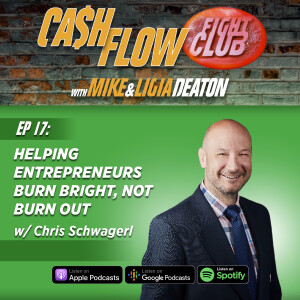
Wednesday Nov 01, 2023
Wednesday Nov 01, 2023
Are you looking to take your mindset and performance to the next level? In today’s episode, real estate investor Chris Schwagerl shares his insights on developing a champion mindset. Chris discusses his journey from social worker to financial freedom through real estate investing. He emphasizes the importance of defining what "enough" means for you and letting go of limiting beliefs from your past.
Here are some power takeaways from today’s conversation:
[02:19] - Creating wealth on a social work wage
[09:22] - How the book Rich Dad Poor Dad saved his life
[13:45] - The payment for being an entrepreneur
[16:47] - The three phases in the helping/service industry
[26:56] - The power of mentorship
[30:49] - The key factors of success
[38:23] - Chris’ mission with Infinite Skies
Episode Highlights:
[13:45] The Payment for Being an Entrepreneur
While this personal growth is rewarding, it also comes with its challenges. Entrepreneurs must constantly improve themselves and may experience more stress and isolation than other careers. However, according to Chris, this constant personal development is the price entrepreneurs pay for the rewards and freedoms of being their own boss.
[16:47] The Three Phases In The Helping/Service Industry
Chris talks about the three phases that people in helping or service industries like social workers, doctors, nurses, and therapists often go through:
Phase one is being purely passionate about the work and not concerned about pay. Just wanting to help people and make an impact.
Phase two is when people become managers of others doing the actual jobs they originally wanted to do themselves. They take on more administrative tasks and responsibilities to earn a more livable wage.
Phase three is when people either leave the industry altogether to pursue higher paying work, or they stay but become jaded, hostile, and no longer able to properly serve their clients and community.
According to Chris, his goal through real estate investing and the work he does is to help people avoid moving from phase two to phase three - to allow them to stay passionate about their helping roles while also attaining adequate pay and financial security.
[31:30] The Key Factors of Success
Grit and determination. He notes how you can often tell who will succeed based on those who are raring to go and knocking down any obstacles without playing the victim.
Not being afraid of failure. Successful people see failures and setbacks as learning opportunities rather than something to fear.
Defining what "enough" means for themselves. Setting clear goals based on personal fulfillment rather than constantly comparing to others.
Letting go of limiting beliefs and messages absorbed from childhood that no longer serve them. Successful people are willing to challenge old mindsets.
Constant personal development and growth. Entrepreneurship provides ongoing lessons that force people out of their comfort zones.
Surrounding yourself with complementary skills. No one person can do it all, so successful entrepreneurs build teams to cover different strengths.
Resources Mentioned:
Chris Schwagerl, LICSW | LinkedIn
Chris online at Chris Connects
Rich Dad Poor Dad

Wednesday Oct 25, 2023
Wednesday Oct 25, 2023
Are you looking for ways to improve your business processes and take your organization to the next level? Then you won't want to miss this episode featuring Michelle Kimbro, a Lean Six Sigma Master Black Belt and business coach with over 25 years of healthcare leadership experience. In this episode, Michelle shares her insights and experiences on mindset mastery, high performance habits, and organizational culture. She also discusses the lean operating system, empowering frontline staff, innovation through failure, and much more.
Here are some power takeaways from today’s conversation:
[01:31] - Michelle’s transition from corporate to consulting
[07:32] - The importance of passion and mentorship in entrepreneurship
[13:16] - Overcoming regret and saying yes to opportunities
[18:54] - The different mindset of entrepreneurs and corporate executives
[21:14] - The lean operating system
[29:01] - Work-life balance and productivity tips
[34:03] - Managing distractions and optimizing work hours for productivity
[46:45] - Embracing failure as an opportunity for innovation
Episode Highlights:
[07:32] The Importance of Passion and Mentorship in Entrepreneurship
Passion is a key driver in starting a successful business, according to an experienced entrepreneur. It's important to focus on what you enjoy doing, as starting a business in something you dislike can quickly turn into a job that you hate. Along with passion, having the necessary skill set is also crucial. Seeking out successful individuals in your industry and learning from them through mentorship and coaching is a great way to develop your skills and knowledge. By being open to learning and absorbing everything you can about your desired business, you can increase your chances of success.
[13:16] Overcoming Regret and Embracing Opportunities
Regret can be a powerful force in the mind, according to a business owner. For Michelle, the fear of looking back on her life with regret was a bigger motivator than the fear of failure. To combat this, she took the advice of a friend who encouraged her to say "yes" to every opportunity that came her way. Whether it was a small coffee meeting or appearing on a podcast, she believed that every opportunity had the potential to lead to something great. By being open to new experiences and possibilities, you can overcome your fears and move beyond the barriers holding you back.
[21:14] The Lean Operating System and Trusting Frontline Staff
Implementing a lean operating system requires leaders to trust their frontline staff, a difficult pill for some to swallow. However, employees are a company's biggest asset, as they work directly with the issues and often develop workarounds for existing problems. By providing staff with tools, coaching, and methodology, they can improve the organization as a whole by identifying and fixing problems at the source. This approach empowers employees to take ownership of their work and encourages innovation and continuous improvement. Through trusting and supporting frontline staff, leaders can foster a culture of collaboration and growth, leading to greater success for the company in the long run.
[46:45] Embracing Failure as an Opportunity for Innovation
Failure is a learning opportunity. In a society where failure is often stigmatized, reframe failure with the mindset of "What can I learn?" or "What's the inherent lesson?" By embracing failure, entrepreneurs can drive innovation and ultimately reach their goals. As an entrepreneur herself, Michelle constantly tests and experiments with different approaches and changes, analyzing the results to determine what works and what doesn't. Through this iterative process, she is able to innovate and stay ahead of the competition.
Resources Mentioned:
https://michellekimbro.com

Wednesday Oct 18, 2023
Wednesday Oct 18, 2023
In this episode, we explore two asset classes primed for impressive returns – laundry facilities vs. carwash. Discover the minimum investment required, projected returns, and the tax benefits that come with these investments. Joining today’s matchup are Sam Wilson, a licensed Realtor with expertise in laundry facilities, and Rob Wolfe, CEO of Wolf Strategic Partners, who brings a wealth of knowledge in maximizing investment returns from the carwash business model. Get ready for insights, rivalry, and a quest for victory!
Here are some power takeaways from today’s conversation:
[04:04] - Rob and Sam’s respective backgrounds
[06:59] - How to invest in laundry facilities
[10:09] - How to get double-digit ROI with laundromats
[16:21] - The best way to invest in car washes
[26:25] - Car washes from the ground-up through operations
[30:00] - Laundromat business strategies and innovations
[36:56] - Financing options for laundromat businesses
[40:13] - Business strategy and risk management for both asset classes
Episode Highlights:
[06:59] The Laundry Facility Investment Fund
Sam explained that investing in individual laundromats through single-asset syndications is not financially viable due to the high setup costs involved. Instead, they have introduced an investment fund model with the goal of raising $10 million to acquire 20-25 laundry facilities in a specific region. This approach allows for economies of scale in areas such as staffing, marketing, and supply costs. By pooling multiple stores into one fund, they can offer a minimum investment of $50,000 to accredited investors, while also improving diversification and reducing competition risks.
- Minimum Investment: $50,000 into a $10 million fund- Projected Returns: 11-14% cash-on-cash, 16-20% IRR over 8 years- Tax Benefits: Large upfront depreciation on equipment purchases can provide substantial tax write-offs
[16:21] Understanding the Car Wash Business Model
Rob explains that there are three main types of car wash facilities: self-serve bays, in-bay automatics, and express tunnels. Self-serve bays allow customers to wash their own cars using their own supplies, while in-bay automatics provide a wash by rotating equipment around the stationary vehicle. However, Rob invests in express tunnels, where cars queue up and are loaded onto a conveyor belt or track for a thorough cleaning using friction, chemicals, and high-pressure water. This model offers a quick wash time of just 3 minutes on average, preventing long wait times that can discourage customers.
- Minimum Investment: $50,000 for a single-asset syndication- Projected Returns: 17-18% IRR, over 50% cash-on-cash returns initially- Tax Benefits: Significant depreciation available, especially on tunnel equipment. Investors can expect a 40%+ tax write-off in year 1 on a $50k investment.
[40:13] Business Strategy and Risk Management
Laundry Facilities
Focus on modernizing customer experience with clean, safe stores offering value-added services like delivery/drop-off
Launch investment fund to aggregate multiple properties for economies of scale and strategic portfolio growth
Main risks are security issues due to cash-heavy business and potential competition
Car Wash
Invest exclusively in high-volume express tunnel models for optimal throughput and customer experience
Leverage prime commercial real estate locations for maximum vehicle access and visibility
Mitigate competition risk through thorough due diligence on surrounding sites
Potential add-on services like pet washing to increase customer spend per visit
Build in-house management team to directly oversee brand consistency and operations
Resources Explored
Rob Wolfe:Wolfe Strategic PartnersPodcast: Car Wash Capitalist | a podcast by Rob Wolfe (podbean.com)Car Wash Investing: Cowabunga Car Wash Follow Rob on LinkedIn: Rob Wolfe | LinkedIn
Sam Wilson:Bricken Investment Group Podcast: How to Scale Commercial Real Estate on Apple Podcasts Laundry Investment portfolio: Bricken InvestmentsFollow Sam on LinkedIn: Sam Wilson | LinkedIn
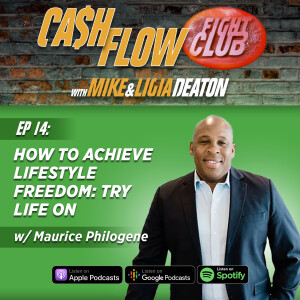
Wednesday Oct 11, 2023
Wednesday Oct 11, 2023
Are you looking for inspiration to live life on your own terms and break free of the traditional 9-5 lifestyle? Maurice Philogene joins the Champion’s Corner to share his inspiring story of forging his own path in life. He discusses how early experiences traveling abroad as a teenager sparked his desire for adventure and led him to pursue multiple careers simultaneously. Maurice shares how he was able to work corporate jobs while also investing in real estate, allowing him the financial freedom to travel the world. He offers valuable insights on developing a mindset of continual learning and personal growth. Maurice also provides tips on how he is now able to coach others thanks to his diverse experiences living an extraordinary life of his own design.
Here are some power takeaways from today’s conversation:
[03:45] - Maurice’s entrepreneurial journey
[11:39] - A career should be your purpose or purposeful
[15:09] - Chasing personal success
[17:47] - The pursuit of growth through continuous learning
[21:00] - Coaching and finding your community
[24:20] - Investing in mentorship and coaching
Episode Highlights:
[11:39] Purposeful Careers: Building for Personal Success
A career should be driven by purpose or be purposeful itself. When your career aligns with your purpose, like my journey as a police officer, it brings fulfillment and joy because you are doing what you love. However, if your current job lacks that sense of purpose, it becomes crucial to use your paychecks wisely. Take those earnings and invest them in something that resonates with you, whether it's nurturing relationships, gaining valuable experiences, or investing in assets like real estate or dividend stocks. By using your paychecks purposefully, you can build something meaningful for yourself. It's essential to have a perspective that goes beyond the societal notion of success, which often revolves around titles like executive VP, CEO, or partner. Instead, focus on creating a path that aligns with your true aspirations and values.
[15:09] Chasing Personal Success: Maurice's Unconventional Journey
In 2021, Maurice made a bold decision to leave his job when he realized that he hadn't received a promotion since 2013. Contrary to societal expectations, he consistently turned down partner roles, preferring a good salary and staying off management's radar. This confused many, but Maurice was resolute in his pursuit of personal success, which meant prioritizing experiences and building relationships over titles and responsibilities.
Maurice's experience serves as a powerful reminder that success should be defined individually, not by others' standards. By courageously carving his own path, he prioritized what truly mattered to him, leaving behind the conventional notions of success.
[17:47] The Pursuit of Growth: Maurice's Journey of Continuous Learning
Maurice believes in surrounding himself with extraordinary individuals who inspire and challenge him, emphasizing that it's not about financial success but rather their drive to make a difference through initiatives and philanthropy. He has a deep-rooted desire to constantly be in a state of learning, rejecting the notion of reaching the pinnacle of knowledge on a mountaintop. For Maurice, stagnation is a problem. Instead, he actively seeks out unfamiliar situations that push him beyond his comfort zone, where he can embrace the unknown and embark on a journey of continuous growth and discovery.
Resources Mentioned:
www.thequattroway.com Maurice Philogene | Try Life On
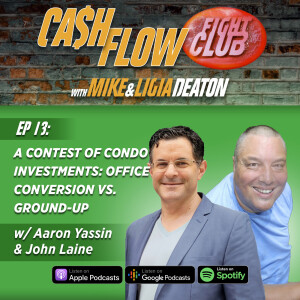
Wednesday Oct 04, 2023
Wednesday Oct 04, 2023
In this episode of the Cash Flow Fight Club podcast, Aaron Yassin and John Laine go head to head in a coast-to-coast real estate battle royale. Aaron pitches his ground-up condominium development model in New York City, while John shares his strategy of converting vacant offices into much-needed Tacoma, Washington housing through condo conversions. Who will be crowned the Cashflow Champion? Tune in to find out which model offers the most compelling risk/return profile for passive real estate investors!
Here are some power takeaways from today’s conversation:
[04:00] - Aaron’s real estate background
[09:00] - John’s real estate background
[13:14] - Investing considerations for office-to condo conversions
[23:42] - Investing considerations for ground-up condo construction
[39:56] - Real estate development risks and opportunities
[44:59] - Real estate investment risks and potential returns
Episode Highlights:
[13:14] Investment Considerations for Office-to-Condo Model
The office-to-condo model is an investment strategy where office buildings are converted into residential condominiums. This approach allows developers to capitalize on the growing demand for urban housing and repurpose underutilized office spaces. Here are some key points about the office-to-condo model:
Minimum Investment: The minimum investment for the office-to-condo model is typically around $100,000. This investment amount may vary depending on the specific project and location.
Accredited Investors: Developers usually prefer to work with accredited investors for such projects. Accredited investors are individuals or entities that meet certain financial criteria and are deemed to have a higher level of sophistication and understanding of investment risks.
Return on Investment: With the office-to-condo model, investors can expect a return of their capital within approximately 30 months. This timeline may vary based on project specifics.
Long-Term Cash Flow: One of the advantages of the office-to-condo model is the potential for a steady stream of cash flow over the long term. By acting as a "bank," developers can create a second mortgage income stream, doubling their profits. This cash flow can last for up to 30 years or as long as the investor holds the mortgage.
[23:42] Investment Considerations for Ground-Up Condominium Construction Model
The Ground-Up Condominium Construction model is a real estate investment strategy that involves constructing condominium buildings from scratch. Here are some key points about this model:
Higher Projected Returns: The Ground-Up Condominium Construction model offers higher projected returns compared to traditional value-add multifamily investments. Investors can expect returns in the range of 60-70% over a shorter hold period of 24-30 months. These returns are subject to market conditions and project-specific factors.
Design Optimization: With ground-up construction, developers have the opportunity to fully design the building to optimize functionality, sustainability, and aesthetics. This allows for greater control over the final product and can enhance the market appeal of the condominiums. However, there are inherent risks associated with obtaining approvals, demolition, and foundation work.
Exit Strategy: The exit strategy for the Ground-Up Condominium Construction model involves pre-selling individual condo units. This means that the project must be sufficiently completed before closing sales can take place. Pre-selling allows developers to secure buyers and ensure a smoother transition to the next phase of the project.
Minimum Investment and Returns: Passive investors can participate in this model with a minimum investment of $50,000. Depending on the specific project, annualized returns of 23-25% or higher can be expected.
Resources Mentioned:
Aaron Yassin’s website: www.DesignDrivesValue.com
John Laine on LinkedIn : https://www.linkedin.com/in/john-laine-ratracerescue








